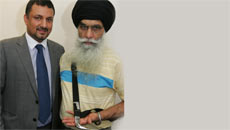Malaysian Prime Minister Najib Razak said Saturday that the communications system of the Malaysia Airlines jet that went missing March 8 was disabled just before it reached the east coast of peninsular Malaysia even as India intensified its end of the multinational search operation.
"Based on new satellite communication, we can say with a high degree of certainty that the aircraft communications, addressing and reporting system were disabled just before the aircraft reached the east coast of peninsular Malaysia," he said at a press conference here.
"Shortly afterward, near the border between Malaysian and Vietnamese air traffic control, the aircraft's transponder was switched off."
From this point onwards, the Malaysia air force radar data showed an aircraft, which was believed but not confirmed to be the missing jet, did indeed turn back and flew in a westerly direction, back over peninsular Malaysia before turning northwest, Xinhua quoted Razak as saying.
"These movements are consistent with deliberate action by someone on the plane," he added.
Malaysia Airlines flight MH370 with 239 passengers and crew on board vanished mysteriously about an hour after taking off from Kuala Lumpur early morning March 8. The Boeing 777-200ER was initially presumed to have crashed off the Vietnamese coast in the South China Sea.
The plane took off from Kuala Lumpur at 12.41 a.m. March 8 and was due to land in Beijing at 6.30 a.m. the same day. The 227 passengers on the flight included five Indians, 154 Chinese and 38 Malaysians.
Contact with the plane was lost along with its radar signal at 1.40 a.m. March 8 when it was flying over the air traffic control area of Ho Chi Minh City in Vietnam.
Based on the new data, the aviation authorities of Malaysia and their international counterparts have determined that the plane's last communication with the satellite was in one of two possible corridors - a northern corridor stretching approximately from the border of Kazakhstan and Turkmenistan to northern Thailand, or a southern corridor stretching from Indonesia to the southern Indian Ocean.
In view of this latest development, the Malaysian authorities have refocused their investigation into the crew and passengers on board the plane.

"Despite media reports that the plane was hijacked, I wish to be very clear, we're still investigating all possibilities as to what caused MH370 to deviate from its original flight path," he said.
Malaysian authorities have decided to end the search operation in the South China Sea and shift the focus of search efforts to the Indian Ocean, Razak added.
Following Razak's statement, Vietnam and Thailand suspended their sides of the search operation.
Vo Van Tuan, deputy chief of the General Staff of Vietnam People's Army, told reporters in Hanoi the decision was made after Vietnam received information from its ambassador to Malaysia Saturday afternoon that Malaysia has decided to stop searching in the South China Sea, Xinhua reported.

The Thai navy too Saturday suspended its search over the Gulf of Thailand and Andaman Sea for the missing jet, navy spokesman Karn Dee-ubon said.
Meanwhile, India has further intensified efforts to find the missing aircraft with additional naval and air assets being deployed for searching an expanded area in central and east Bay of Bengal, the defence ministry said Saturday.
So far, no sighting or detection has been reported by any of the units.
The third day of the Indian search efforts saw the deployment of two recently acquired P8I Long-Range Maritime Patrol aircraft of the Indian Navy and one C-130 J aircraft of the Indian Air Force in the Bay of Bengal and the Andaman Sea, ministry officials said.

In a related development, Malaysian police have searched the house of Captain Zaharie Ahmad Shah who flew the aircraft that is now missing.
Three policemen arrived at the captain's house soon after Prime Minister Razak confirmed Saturday that the plane was suspected to have been diverted deliberately, the Malaysian Star reported.
The captain's investigation will include his political and religious views and also his hobbies and behaviour with friends and family.





